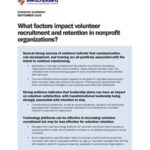This article reviews 81 articles that directly tested the effectiveness of volunteer management practices. Many articles measured volunteers’ perceptions of the quality of management practices, not the practices themselves, making their utility to volunteer managers limited. Most articles used self-reported, cross-sectional surveys and subjective outcome measures such as satisfaction and intent to continue volunteering. Despite these limitations, current research supports the effectiveness of 11 best practices: liability insurance, clearly defined roles, job design, recruitment strategies, screening and matching, orientation and training, supervision and communication, recognition, satisfying motivations, reflection and peer support. No support has yet been found for three supposed best practices suggested by the practitioner literature: written policies, recordkeeping and individual evaluations. Future studies should use more rigorous methods, including validated measures, external ratings of volunteer effectiveness, field experiments and longitudinal surveys.
A Systematic Review on the Impact of Trauma-Informed Education Programs on Academic and Academic-Related Functioning for Students Who Have Experienced Childhood Adversity
The purpose of this study was to conduct a systematic review of the existing literature regarding trauma-informed education programs and their impact on academic and academic-related outcomes. The articles included for review (n=15) contained data on trauma-informed education programs implemented in preschool, primary/elementary, and high school settings. Academic and academic-related outcomes reported included attendance, disciplinary…

